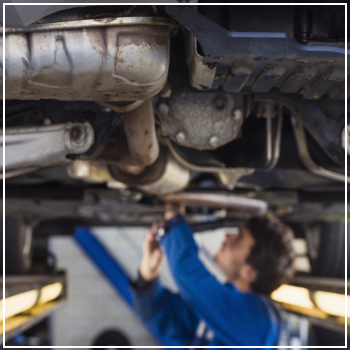 When you spot rust on your car, it's easy to think it's just a surface issue. But if ignored, rust can become a serious structural problem. One often overlooked area is the exhaust system—vital for your vehicle’s performance and safety.
When you spot rust on your car, it's easy to think it's just a surface issue. But if ignored, rust can become a serious structural problem. One often overlooked area is the exhaust system—vital for your vehicle’s performance and safety.
The exhaust system runs beneath your car, handling emissions and directing them away from the engine. It's exposed to harsh conditions, especially during winter when road salt is common. Over time, this exposure can lead to rust, which not only affects performance but can also pose health risks. So, how does the exhaust system get rusty? Let’s break it down.
Common Causes of Exhaust System Rust
There are several reasons why your exhaust system might start to rust:
- Short trips: If you don’t drive far or long enough for the engine to fully warm up, moisture can build up inside the exhaust system. This condensation doesn’t evaporate properly, leading to internal corrosion over time.
- Winter conditions: Snow, ice, and road salt can directly damage the undercarriage. The exhaust system is particularly vulnerable because it sits low and is constantly exposed to these elements.
- Water in the fuel system: Sometimes water can enter the fuel system, causing a process called cold condensate corrosion. This leads to rust forming inside the exhaust pipes over time.
Why This Is a Serious Problem
The exhaust system isn’t just about getting rid of fumes—it plays a key role in filtering harmful emissions. When it starts to rust, the entire system can be affected. For example, carbon monoxide, a dangerous gas, may escape into the cabin instead of being safely expelled through the tailpipe.
If the catalytic converter fails due to rust, it could release up to 30,000 to 100,000 parts per million (ppm) of carbon monoxide—far above the safe limit of 100 ppm set by OSHA. And since carbon monoxide is odorless and tasteless, you might not even realize you're being exposed until it's too late.
Other signs that your exhaust system may be rusting include:
- Reduced fuel efficiency – A damaged exhaust system can make your engine work harder, leading to higher fuel consumption.
- Engine performance issues – You may notice slower acceleration and lower miles per gallon.
If you’re worried about rust affecting your exhaust system, it’s best to have it checked by a professional. At DaSilva’s Auto Body, we offer expert inspections and repairs to keep your car running safely and efficiently. Don’t wait—contact our Naugatuck location today to schedule an appointment.
HP Cone Crusher
(1) The limited crushing level can be used to produce finer products. Reduce maintenance downtime and increase the confidence of operators.
(2) Use the two-way iron passing release hydraulic cylinder to discharge the iron block, and implement the cleaning operation of the crushing chamber with large eccentricity when necessary. Dual accumulators can improve the response speed of the hydraulic system.
(3) HP series cone crusher can ensure the highest personnel safety and convenience of maintenance.
(4) The convenient disassembly and assembly of all key components from the top of the crusher, the convenient replacement of the lining plate, the one button fixed cone rotation disassembly function, the lining plate without the use of filler, and the comprehensive operation protection of the ICTM automation system all make the HP series the most reliable cone crusher.
Hp Eccentric Assembly,Eccentric And Bushing,Sturdy Counterweight Liner,Sturdy Counterweight Assy
Shenyang Ule Mining Machinery Co., Ltd , https://www.ulecrusherparts.com
